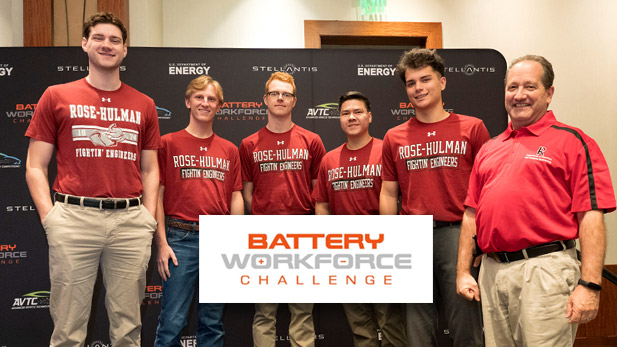Students, Faculty Selected for Advanced Battery Design Competition

Electrical and Computer Engineering Professor Marc Herniter, PhD, and student leaders of Rose-Hulman’s Battery Workforce Challenge team attended a workshop this fall that introduced aspects of the three-year competition.
The future is now for Rose-Hulman students and faculty developing innovative battery technology that will enhance the expanding electric vehicle industry through involvement in the Battery Workforce Challenge, announced by the U.S. Department of Energy (DOE), Stellantis, and other government and industry partners.
The three-year immersive hands-on learning experience, managed by the DOE’s Argonne National Laboratory, will feature 12 select North American colleges and universities combined with vocational training and youth education in STEM. Rose-Hulman was the only college from Indiana accepted for this competition after requests for proposals were sent to ABET accredited institutions across the continent. Applications underwent extensive review of factors including institutional administrative support, student and faculty interest, quality of laboratory facilities and computing capabilities, safety procedures, curriculum integration, and career and technical educational outreach.
DOE has set a bold target to address the climate crisis that puts the nation on a path to achieve net-zero emissions, economy-wide, by 2050 for the benefit of all Americans. Officials point out that key elements toward achieving this goal are the design and development of advanced batteries to electrify the transportation and energy sectors. The Battery Workforce Challenge seeks to build a highly skilled domestic workforce with the hands-on experience and knowledge needed for in-demand positions throughout the EV/battery industry.
“The Battery Workforce Challenge provides an opportunity for our students to explore and create new advances in technology that could drive the future of the automotive industry,” says Rose-Hulman Provost and Vice President for Academic Affairs Rick Stamper, PhD. “At the same time, they will be taking steps forward toward developing the critical skills needed to lead the workforce in this exciting field within advancing technology.”
Enhancing the Rose-Hulman team’s efforts will be the development of a partnership with Ivy Tech Community College in Terre Haute.
“This partnership will provide significant benefits to students well beyond their classroom and lab experience,” added David Will, a Rose-Hulman mechanical engineering alumnus and dean of Ivy Tech’s School of Advanced Manufacturing, Engineering & Applied Sciences. “Our students bring excellent technical skills in advanced automation and robotics technology, machine tool technology, industrial design, welding, and more. Working in collaboration with Rose-Hulman students will help advance their development of professional skills in areas like communication, time and conflict management, and more.”
Industry partnerships will also be forged to assist students from both colleges throughout the next three years.
Other Battery Workforce Challenge participants will be California State University-Los Angeles, Clemson University, Colorado School of Mines, Jackson State University, McMaster University (Canada), Ohio State University, University of Alabama, University of California-Merced, University of Michigan-Dearborn, University of Nevada-Las Vegas, and University of Waterloo (Canada).
Rose-Hulman’s effort is being led by Marc Herniter, PhD, professor of electrical and computer engineering, and Zac Chambers, PhD, professor of mechanical engineering, and will involve current and future students from a variety of academic degree areas. They have also led past participation in U.S. Department of Energy ChallengeX, EcoCAR and EcoCAR2 competitions, which had former project members graduate to work within the automotive and sustainable energy industries.
Throughout the competition, Rose-Hulman and Ivy Tech students will design, build, test, and integrate an advanced electric vehicle battery pack into a Stellantis vehicle. The first two years will involve development of a functioning battery pack after following real-world industry milestones focused on battery design, simulation, controls development, testing, and vehicle integration and demonstration. The battery system will then be implemented into the vehicle during the third and final year of the competition, which will conclude with a performance review organized by a panel of industry professionals.
“As faculty, we delight in opportunities to incorporate challenges like the Battery Workforce Challenge into our curriculum, as we've successfully done with past ChallengeX, EcoCAR, and EcoCAR2 challenges. We're excited to develop new courses to support the program and cultivate students' skills and interests,” said Herniter, who specializes in analog electronics, power electronics and automotive systems.
Mechanical engineering alumnus Ryan Schulten, an on-board diagnostics calibration supervisor with Stellantis, noted that working on the EcoCAR challenge gave him not just tool and design experience, but also a broader sense of project scope that has made him successful throughout his career. Schulten states that working with faculty on a challenge team "was incredibly useful in building me into a well-rounded engineer, who can plan and complete complex projects thoroughly and on time."
The Battery Workforce Challenge team will use campus workspace and have access to high-performance desktop computers for Computer Assisted Design and model simulations.
“We have the facilities and equipment needed for success in this challenge, and our students can’t wait to get started on this next adventure,” added Chambers, who specializes in hybrid vehicle powertrains and model-based system design for a variety of purposes. “This is another excellent opportunity for our students to implement what they’re learning in the classroom into a real-world application. There’s already has been a lot of interest in this project by our students and I’m sure future students will want to jump on board as well.”
Other Rose-Hulman faculty involved in different aspects of this project will be Craig Downing, PhD, associate dean of lifelong learning and head of the Department of Engineering Management; Rachel Atherton, PhD, assistant professor of English; Nathan Brooks, PhD, assistant professor of electrical and computer engineering; Zak Estrada, PhD, associate professor of electrical and computer engineering; Daniel Hashemi, PhD, assistant professor of physics and optical engineering; and Mike Mueller, PhD, professor of chemistry and biochemistry.